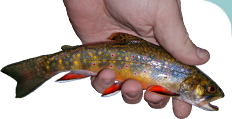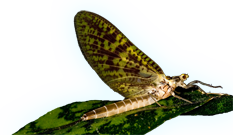Blog & Latest Updates
Fly Fishing Articles
Insects by Common Name


> > Emergers
| Martinlf | April 18th, 2007, 12:58 pm | |
Moderator Palmyra PAPosts: 3233 | Hey Gonzo, this question's for you, but I hope others will join in once the discussion gets underway. Renee Harrop has a photo of an emerging baetis (I first saw it in a Flyfisherman article, and think the photo shows up in at least one of his books. The fly shows short split wings just unfolding, and a long, carrot shaped shuck. The baetis and paralep (blue quill) emergers in your book have virtually the same silhouette, and a very recent modification of my version of the old Little Lehigh Flyshop baetis emerger also does. For the shuck I use long CDC strands, snip a few strands short on the bottom for legs, and tie a thread knot around the long strands near the end and add a minute drop of super glue to the knot. Then I snip out a few strands in the tail, just like your shuck (I also use a glued thread knot on your fly--heresy, I know but my fingers are too clumsy to do it the other way). The question is, do you use your baetis and blue quill pattern for any of the larger mayflies, such as Hendricksons (E. subvaria)or do you prefer the emerger tied on the swimming nymph hook for these larger flies--and if so, why? I'm also interested in your thoughts on my Little Lehigh pattern, which I'll show you at some point to see if improvements can be made. I know you're not a big fan of CDC, but this fly has taken some big browns for me, so it'll be difficult, if not impossible to break my addiction to it. I'm wondering about using poly yarn or another synthetic for the clump wing, though, and/or possibly switching to an antron or zelon shuck. One thing I learned about your emerger this spring is that it is tough as nails. My CDC shucks may not prove to be, especially now with the bound fibers that can't so easily slip though a brown's teeth. Time and testing will tell on some of these issues, but other folks may find them interesting for now, so I'm posting this up. | |
| "He spread them a yard and a half. 'And every one that got away is this big.'" --Fred Chappell | ||
| GONZO | April 19th, 2007, 11:34 am | |
Site Editor "Bear Swamp," PAPosts: 1681 | Louis, I do use the "shucking dun" style for larger mayflies as well, and it is successful. The only argument I can make for the "half-and-half" style is that the nymphal half might be more attractive from a distance or for fish focused on emerging nymphs. But both work well. Don't pay too much attention to my CDC prejudices. Although the CDC shuck's durability might not match that of the synthetic fiber version, I'm always happy to hear about other's experiments and variations on the tying ideas in the book. It's really what I intended. (And your use of a thread knot for gathering the shuck and creating tails isn't heresy, it's practical and personal. Good for you!) | |
| Martinlf | April 19th, 2007, 6:18 pm | |
Moderator Palmyra PAPosts: 3233 | Thanks, Gonzo. Do any others have thoughts on emergers? I fished them almost exclusively this spring and last season. Fish seem to take them readily under many conditions. | |
| "He spread them a yard and a half. 'And every one that got away is this big.'" --Fred Chappell | ||
| Riverratben | April 20th, 2007, 7:44 pm | |
| Pueblo Colorado Posts: 7 | My go to guide fly is an emerger pattern made of all grey rabbit fur. it is nothing special, just your typical emerger. Underfur tail, underfur dubbed body, and an underfur wing with 2 strands of crystal flash in it, then a dubbed head. Very Very easy to tie. You can not screw up the presentation if you make your length of line between the indicator and split shot 1 1/2 times the depth of the water, the split shot needs to be at least a "B", and your distance from split to fly needs to be 16-22". If you swing the fly through the water for the last 45% of the cast you will catch fish almost any time of the year. | |
| SEVERELY ADDICTED! | ||
Quick Reply
You have to be logged in to post on the forum. It's this easy:
Related Discussions
| Title | Replies | Last Reply |
| Re: Griffiths Gnat In Fly Tying by Mcflyangler | 1 | Jun 20, 2016 by Flytyerinpa |
| Re: life cycle In General Discussion by Ladder34 | 2 | Aug 28, 2011 by Sayfu |
| Re: Emergers In Fly Tying by Fishingguru | 3 | Feb 8, 2008 by Dano |
| Re: Caucci's Compara-Nymph Step by Step In Fly Tying by NEMatt | 6 | Jul 10, 2014 by NEMatt |
| Re: Cinabar Flymph In Fly Tying by Softhackle | 3 | Dec 3, 2010 by FredH |
| Re: Mayflies which crawl underwater to lay their eggs In General Discussion by Troutnut | 1 | Jul 22, 2006 by Taxon |
| Re: Snowshoe Question In Fly Tying by Martinlf | 8 | Mar 4, 2013 by Martinlf |
| Re: maggot ball In Fly Tying by Bowmandjk | 4 | Nov 6, 2007 by Bowmandjk |
| Re: Isonychia velma dun emerging (5 more) In the Photography Board by Millcreek | 7 | Jan 2, 2017 by Jmd123 |
| Re: Now to tie a Baetis Dun Imitation In Female Baetis Mayfly Dun by DarkDun | 3 | Jan 16, 2007 by Martinlf |
Troutnut.com is copyright © 2004-2024 Jason
Neuswanger (email Jason). See my FAQ for information about use of my images.
 privacy policy
privacy policy

